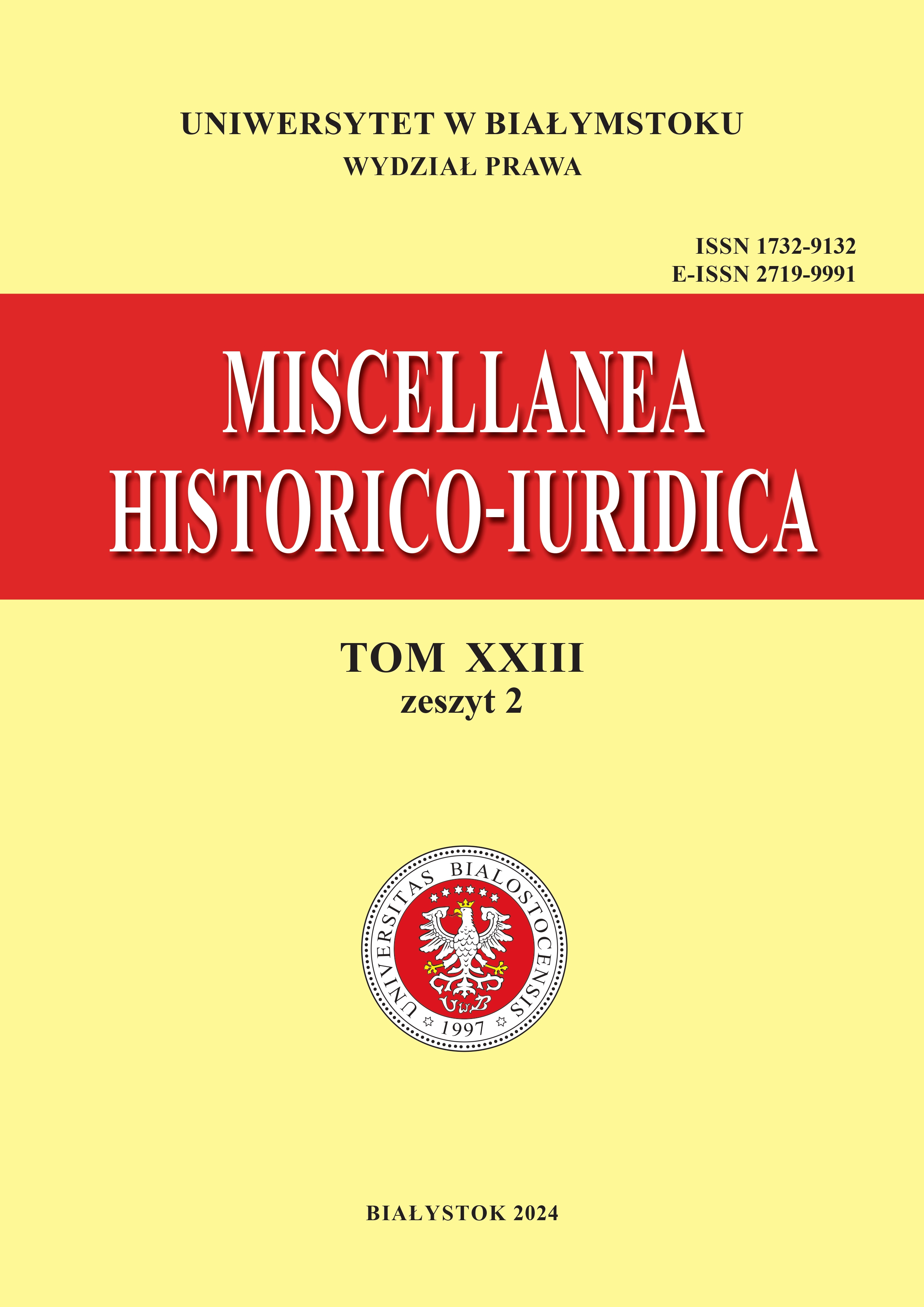On the Centenary of the Assassination of President Stanisław Wojciechowski. The Case of Stanisław Steiger in the Light of Lviv Archival Materials
Keywords:
Eastern Galicia, Second Polish Republic, trial, assassination, anti-state crimes, national conflictAbstract
The summary courts established in Eastern Galicia were intended to be a tool for eliminating repeated serious crimes. This idea was quickly distorted, and prosecutors willingly used this measure in individual cases. One of the victims of this system was Stanisław Steiger, who was accused of carrying out an attack on President Stanisław Wojciechowski in 1924. This law student was involved in a dangerous game in which not only his life was at stake, but also the good name of the State Police and the future of Eastern Galicia. Two court trials showed how the case turned from an obvious case into an extremely complicated one. They also revealed the machinery of police manipulation aimed at revealing a communist or Jewish-communist conspiracy.
The article presents the course of preparatory and court proceedings based on the analysis of source material collected in State Archives of Lviv Oblast (Дepжaвний аpxiв Львiвcькoї облacтi). It reveals details of the work of the police, the investigating judge and the prosecutor, while transcripts of the hearings published in the press present the lines of defense and accusations adopted by the parties. A comprehensive view of the matter allows us to see a difficult neighborhood, both based on local ethnic relations in Eastern Galicia, as well as in the international aspect, where Stanisław Steiger’s case was played by German intelligence protecting the real assassin and trying to discredit Poland in the eyes of the League of Nations. An unexplained thread remains the attitude of the Ukrainian emigration representative office, which ultimately could not or was unable to use the ongoing process to draw the attention of Western public opinion to the nationality problem in Eastern Galicia.
References
Państwowe Archiwum Obwodu Lwowskiego we Lwowie, (Дepжabhий Apxib Льbibcьkoї Obлacтi), Sąd Okręgowy we Lwowie, fond 11.
Archiwum Akt Nowych w Warszawie, Komenda Główna Policji Państwowej w Warszawie (nr 349/1).
„Chwila”, Lwów, roczniki: 1924, 1925, 1926.
„Gazeta Poranna”, Warszawa, rocznik: 1924.
„Gazeta Poranna”, Lwów, rocznik: 1925.
„Gazeta Narodowa”, Warszawa, rocznik: 1925.
„Kurier Lwowski”, Lwów, rocznik: 1925.
„Kurier Poranny”, Warszawa, rocznik: 1925.
Dziennik Ustaw Państwa, rocznik 1885.
Gauden Grzegorz, Polska sprawa Dreyfusa. Kto próbował zabić prezydenta, Warszawa 2024.
Kocznur Jan, Z historii wymowy sądowej w b. zaborze austriackim, „Palestra” 1963, nr 7–9.
Laniewski Alfred, Zbrodnia i łzy. Dwanaście lat prokuratorskiej służby: myśli, wrażenia, przeżycia, Lwów 1936.
Łętocha Barbara, The Steiger Trial, “Justice” 2001, nr 29.
Melamed Vladimir, The trial: “And we, having lived here for 600 hundred years, are not just guests, we are masters too.” Steiger affair and ukrainian‑jewish relations in eastern galicia in the 1920s, “The Independent Cultural Journal «JI»” 2008, nr 51.
Przeworski J., O postępowaniu doraźnem, „Gazeta Sądowa Warszawska”, Warszawa, 20 grudnia 1919, nr 43.
Smirnow Jurij, Lwowskie sensacje. Tajemnice policyjnych prowokacji, „Nowy Kurier Galicyjski”, [b.m.w.], 31 maja –16 czerwca 1922, nr 10 (398).
Śmiałek Anna, Sądy doraźne w II Rzeczypospolitej, „Czasopismo Prawno‑Historyczne” 1984, nr XXXVI, z. 1.
Ustawa o postępowaniu karnym […], oprac. Kazimierz Konstanty Angerman, Warszawa 1924.
Downloads
Published
Issue
Section
License
Copyright (c) 2024 Uniwersytet w Białymstoku (entire issue as a whole); Jacek Wałdoch (article)

This work is licensed under a Creative Commons Attribution-ShareAlike 4.0 International License.







